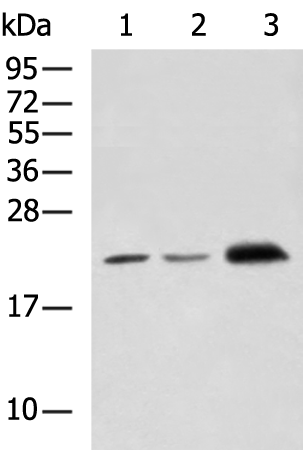
| WB | 咨询技术 | Human,Mouse,Rat |
| IF | 咨询技术 | Human,Mouse,Rat |
| IHC | 咨询技术 | Human,Mouse,Rat |
| ICC | 技术咨询 | Human,Mouse,Rat |
| FCM | 咨询技术 | Human,Mouse,Rat |
| Elisa | 1/5000-1/10000 | Human,Mouse,Rat |
| Aliases | HST2; HBGF-6 |
| WB Predicted band size | 23 kDa |
| Host/Isotype | Rabbit IgG |
| Antibody Type | Primary antibody |
| Storage | Store at 4°C short term. Aliquot and store at -20°C long term. Avoid freeze/thaw cycles. |
| Species Reactivity | Human, Mouse |
| Immunogen | Synthetic peptide of human FGF6 |
| Formulation | Purified antibody in PBS with 0.05% sodium azide and 50% glycerol. |
+ +
以下是关于FGF6抗体的3篇参考文献,包含文献名称、作者及简要摘要内容:
---
1. **文献名称**: "Fibroblast Growth Factor 6 (FGF6) Regulates Muscle Regeneration via Satellite Cell Activation"
**作者**: Floss T, et al.
**摘要**: 研究利用特异性FGF6抗体在小鼠模型中证明FGF6通过激活卫星细胞促进骨骼肌再生,抗体用于检测损伤后肌肉组织中FGF6的表达定位。
2. **文献名称**: "Characterization of a Monoclonal Antibody Against Human FGF6 and Its Application in Cancer Studies"
**作者**: Tanaka S, et al.
**摘要**: 报道了一种高亲和力单克隆FGF6抗体的开发,验证了其在免疫组化和Western blot中的特异性,并发现FGF6在结直肠癌组织中高表达,与肿瘤进展相关。
3. **文献名称**: "FGF6 Modulates Fibrotic Pathways in Chronic Kidney Disease"
**作者**: Zhang Y, et al.
**摘要**: 通过FGF6抗体阻断实验,发现FGF6通过激活TGF-β信号通路促进肾脏纤维化,提示其作为治疗慢性肾病的潜在靶点。
---
以上文献聚焦于FGF6抗体在肌肉再生、癌症及纤维化疾病中的功能研究和应用。如需具体期刊信息或年份,可进一步补充关键词检索。
Fibroblast Growth Factor 6 (FGF6) is a member of the FGF family, which comprises 23 secreted signaling proteins involved in tissue repair, embryonic development, and metabolic regulation. FGF6. specifically, is encoded by the *FGF6* gene and shares structural homology with FGF23. It primarily binds to fibroblast growth factor receptors (FGFRs) with heparan sulfate as a cofactor, activating downstream pathways like MAPK and PI3K/AKT. FGF6 is highly expressed in skeletal muscle and plays a critical role in myoblast proliferation, muscle regeneration, and injury response. Dysregulation of FGF6 is linked to muscle pathologies, including muscular dystrophy, and certain cancers due to its mitogenic and angiogenic properties.
FGF6 antibodies are immunological tools designed to detect, quantify, or inhibit FGF6 in research and diagnostics. These antibodies are typically generated in hosts like rabbits or mice using recombinant FGF6 protein or peptide epitopes. They enable applications such as Western blotting, immunohistochemistry (IHC), ELISA, and functional studies to explore FGF6’s role in muscle homeostasis, cancer progression, or regenerative mechanisms. Monoclonal antibodies offer high specificity, while polyclonal antibodies detect multiple epitopes. Validation is crucial to ensure cross-reactivity avoidance with homologous FGFs (e.g., FGF9). Commercially available FGF6 antibodies aid in biomarker studies, therapeutic target validation, and understanding FGF6’s dual role in tissue repair and disease. Ongoing research focuses on its therapeutic potential in muscle-wasting disorders and as a cancer biomarker.
×